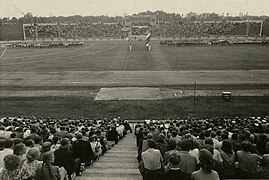Kalevi Keskstaadion
 | |
 | |
| Former names | Komsomoli Staadion |
|---|---|
| Location | Tallinn, Estonia |
| Owner | Sports Association Kalev |
| Capacity | 12,000 (9,908 seated) |
| Record attendance | 21,100 (Tallinna JK Dünamo vs Stockholm IK Sture, 6 June 1956) |
| Field size | 100 m × 68 m (328 ft × 223 ft)[1] |
| Surface | Grass |
| Construction | |
| Opened | 12 July 1955 |
| Renovated | 2019–2022 |
| Architect | Erika Nõva Peeter Tarvas |
| Tenants | |
| Tallinna Kalev (1955–1961, 2002–2016) Tallinna Sport (1985–1989) Tallinna Sadam (1992–1998) | |
Kalevi Keskstaadion is a multi-purpose stadium in Tallinn, Estonia. Opened in 1955 and having a capacity of 12,000, it is the traditional venue of the Estonian Dance Festival and the former home ground of JK Tallinna Kalev. The address of the stadium is Staadioni 8, 10132 Tallinn.
Since 1955, all of the Estonian Dance Festivals have been held there.[2]
History
[edit]20th Century
[edit]
The stadium was built during the Soviet occupation of Estonia and was opened on 12 July 1955. It was the first new large-scale sports complex built in Tallinn after World War II. The initial plans were grandiose: the first blueprints saw the stadium have a 30,000 capacity seating area and a 16,000 capacity standing area, as well as a 6 meter tall statue depicting Estonian folklore hero Kalevipoeg.[3] However, the project was later scaled-down and saw the stadium have a capacity of 12,000.


The record attendance of 21,100 was set in friendly match between Tallinna Dünamo and Swedish third tier club Stockholm IK Sture in 1956. It was the first time since the country's occupation when an Estonian football club was able to face a foreign opponent coming outside of the Soviet Union.[4][5]
In 1960, Tallinna Kalev joined the Soviet Top League and in the following two years, the stadium hosted numerous high-profile football matches. The match against Dynamo Moscow on 5 August 1960 brought around 20,000 people onto the stands and among the players playing was Dynamo's Lev Yashin, who along with a number of his teammates had been crowned European champions less than a month before and who won the Ballon d'Or three years after said match, while being widely regarded as the greatest goalkeeper in the history of the sport.[6]
21st Century
[edit]The 2000s saw the stadium's condition worsen to the point that in 2007, the Estonian FA declared the grass pitch unusable for top-flight football.[7] In 2015, it was announced that Kalevi Keskstaadion will undergo a major renovation and the concept design also included a possibility to increase the capacity to 30,000 in the distant future.[8][9] The renovation works began after the 2019 Estonian Dance Festival and the stadium was re-opened in 2022.[10]
Artificial turf stadium
[edit]The sports complex of the Kalevi Keskstaadion also has an artificial turf ground named Kalevi kunstmurustaadion. Located at the southwest corner of the main stadium, the field is home to Kalev's youth teams.
Gallery
[edit]- Kalevi Keskstaadion in the 1950s
- Kalevi Keskstaadion in 2009
- Stadium at its full capacity.
- The stadium in 2019
- The stadium (in the bottom left corner) in February 2009
- The stadium in August 2023
- Kalevi Keskstaadion after renovation works in August 2022
References
[edit]- ^ "Kalevi Keskstaadion". Eesti spordiregister.
- ^ Kalevi Keskstaadion – Eesti Rahvusstaadioniks. Staadioni tn 3 arendus- ja planeeringu kontseptsioon.
- ^ Vaitmaa, Ester (2017-06-22). "Kalevi staadion". Delfi Longread. Archived from the original on 20 December 2022. Retrieved 2022-12-16.
- ^ Schwede, Indrek (2021). "Jalgpalli positsioonist Eestis ja selle marginaliseerumise põhjustest Nõukogude anneksiooni perioodil". Tartu Ülikooli Kirjastus: 78.
- ^ "Rekordid: Katustel kodupublik ja jubedus võõrsil". Soccernet.ee. 14 February 2013.
- ^ "Lev Jašin Tallinnas (Lev Yashin in Tallinn)". Eesti Spordi- ja Olümpiamuuseum (in Estonian). 4 August 2020.
- ^ "Kalevi Keskstaadion tunnistati mängukõlbmatuks". Soccernet.ee. 11 July 2007.
- ^ "Kalevi keskstaadioni arhitektuurikonkursi võitis ideekavand "Katel"". Moodne Kodu (in Estonian). 25 May 2017.
- ^ "UHKE: vaata, kui ilus on Kalevi staadion pärast uuendamistöid". www.ohtuleht.ee (in Estonian). 4 December 2019.
- ^ Roomets, Katre (2022-06-28). "Uuenduskuuri läbinud Kalevi keskstaadion ootab kasutusluba". ERR (in Estonian). Retrieved 2022-12-16.


 French
French Deutsch
Deutsch





